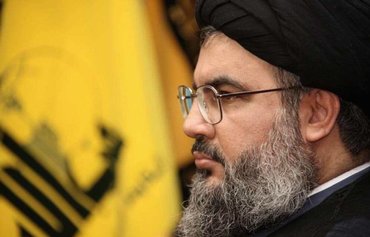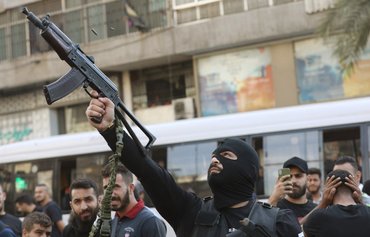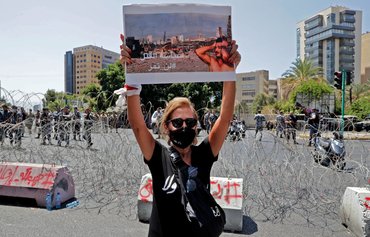BEIRUT -- Since top Lebanese security officials revealed last month they had received intelligence about a plot to assassinate leading figures in Lebanon during the holidays, tensions have been high in the crisis-hit country.
At a December 3 meeting of the Supreme Defence Council, Maj. Gen. Abbas Ibrahim, director of general security and Maj. Gen. Tony Saliba, director of state security said they had received intelligence from several sources.
They did not share the names of the purported targets.
Ibrahim later said he had communicated this information to those concerned with responding to the threat, who immediately took the necessary measures, as part of "pre-emptive plans" to prevent attacks.
The unusual disclosure sparked a storm of questions among the Lebanese public: Who might benefit from assassinations? Who would be capable of carrying them out? Who might be the target? And why?
"When such threats are serious and real, they are not supposed to be made public until measures are taken to protect potential targets," said security expert and retired Lebanese military officer Khalil Helou.
There is still a risk that these threats could be acted on, he said, given the conflict raging in the region.
"When the atmosphere is charged, assassinations are possible," he said, pointing out that they are generally used "to intimidate and silence opponents".
"Intimidation is synonymous with terrorism," he added, noting that some groups try to use it as a means to achieve political ends.
Assassinations linked to Hizbullah
Lebanon has seen this sort of targeted violence before, Helou said.
On December 11, the Special Tribunal for Lebanon sentenced Hizbullah member Salim Ayyash to five life jail terms for the 2005 assassination of former Lebanese prime minister Rafik al-Hariri and 21 others.
A further 226 were wounded in the suicide bombing.
Ayyash, who was found guilty in absentia of murder and terrorism on August 18, is also accused of involvement in the assassination and attempted assassination of other figures belonging to the March 14 coalition.
Helou said the Beirut port explosion of August 4 cannot be separated from the current tensions, and therefore the potential assassinations might be linked to it.
In a December 17 thread on Twitter, former minister Ashraf Rifi claimed that the ammonium nitrate that exploded at the port was sent to Lebanon by Iran's Islamic Revolutionary Guard Corps (IRGC) for the benefit of Hizbullah.
Hizbullah leader Hassan Nasrallah has dismissed claims that the group had stored explosive chemicals at the port. And while no evidence has emerged to link the group to the chemicals, five months after the explosion, an investigation has yet to provide an explanation for what happened.
"The security forces know that Hizbullah controls the port of Beirut for smuggling and importing explosive materials, and that's why the group established a private security and customs area in the port," he said.
Addressing Hizbullah, he added: "We did not and will not fear your assassinations and intimidation. The righteous and wounded martyrs of the port will receive justice, and the truth will be revealed."
Intimidation
Earlier, Rifi noted the "lawlessness that prevails in the region", saying this climate could lead to a rise in assassinations.
"Hizbullah does not hesitate to kill," he said, pointing to the 2012 assassination of intelligence chief Brig. Gen. Wissam al-Hassan and the 2008 killing of senior intelligence official Wissam Eid, bombings in which numerous others were killed.
Rifi's words came after Hizbullah on December 4 filed a lawsuit against former Lebanese MP Faris Souaid, who is leading a campaign to, in his words, "lift the Iranian tutelage over Lebanon".
Hizbullah accused him of provoking sectarian strife.
In a social media post, Souaid said the legal action "aims to pre-emptively clear the party of any harm that comes to its opponents".
Hizbullah is the only group that kept its weapons after Lebanon's civil war ended in 1990 and is believed to have ammunition stored in some parts of the country.
Asked whether assassinations are likely to occur, journalist Tony Abi Najm said, "it is known who has the capability" to carry out this type of attack, noting that the threat can be regarded as "intimidation on the part of some Lebanese parties".
The political and economic crisis, opaque regional scene and external pressures on Hizbullah is pushing it "to intimidate the Lebanese in an effort to control the interior and prevent any potential popular uprising against it", he said.

![The Lebanese Supreme Defence Council meets on December 3. [Photo courtesy of Presidency of the Republic in Lebanon]](/cnmi_am/images/2021/01/06/27587-Lebanon-defence-meeting-600_384.jpg)







There must be assassinations, liquidations and corruption in successful states [unintelligible]. Those who placated the occupiers and licked their shoes do acts that the occupiers themselves are ashamed of doing. Lebanon has died at its sons' hands.
Reply1 Comment(s)